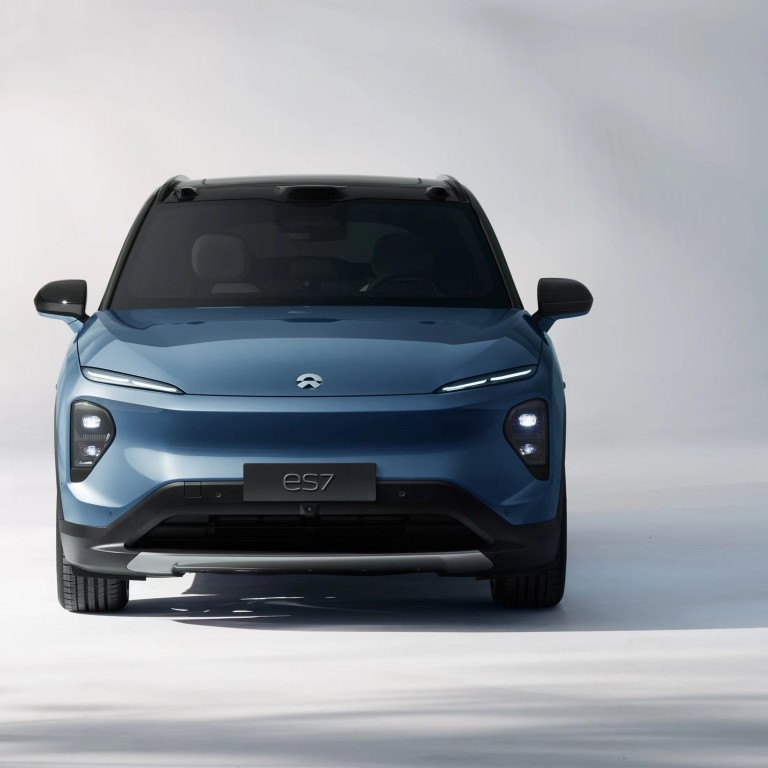
China’s smart EV start-up Nio seeks to challenge BMW, Audi and Mercedes-Benz with its new ES7 luxury midsize SUV
- The ES7, a large five-seat SUV based on the company’s new NT 2.0 platform, will be delivered to customers in late August
- Buyers will be able to save 70,000 yuan on the purchase price if they opt for the battery rental approach
China’s smart electric vehicle (EV) start-up Nio has launched a luxury midsize sport-utility vehicle (SUV) that can go as far as 650 kilometres on a single charge, as it takes the fight to conventional marquees such as BMW and Audi in the world’s largest automotive market.
The ES7, a large five-seat SUV based on the company’s new NT 2.0 platform, will be delivered to customers in late August, by which time it is hoped that damaged automotive supply chains due to Covid-19 pandemic curbs will be fully restored.
“In terms of features and specifications, the ES7 will prove to be a glass ceiling for any other electric or conventional internal combustion engine (ICE) carmaker to break in the luxury SUV segment,” said William Li, co-founder and chief executive of Nio in an online launch event on Wednesday, adding that the company was well prepared to deliver vehicles to customers promptly.
The ES7, Nio’s sixth production model, will be sold at between 468,000 yuan (US$69,697) and 526,000 yuan.
It will be fitted with Adam, Nio’s supercomputing platform, and PanoCinema, a panoramic and immersive digital cockpit with augmented reality (AR) and virtual reality (VR) technologies.
EV maker Nio warns anti-pandemic curbs will hit second-quarter deliveries
Buyers will be able to save 70,000 yuan on the purchase price if they opt for the battery rental approach, which requires a monthly 980 yuan fee.
Nio, Guangzhou-based Xpeng and Beijing-headquartered Li Auto are all regarded as Chinese rivals to Tesla, the undisputed global EV leader, in the mainland Chinese market.
Tesla’s bestselling Model 3 and Model Y vehicles assembled in Shanghai are mainly targeted at middle class customers on the mainland, while its high-end US-made Model S and Model X have yet to gain a foothold with Chinese drivers.
“Luxury electric-powered SUVs are set to strike a chord with some high-net-worth Chinese EV fans,” said Chen Jinzhu, chief executive of consultancy Shanghai Mingliang Auto Service. “Chinese smart EV start-ups hope upcoming luxury models will help them gain the upper hand on Tesla when it comes to luring wealthy drivers.”
Li Auto plans to start delivering its L9 SUV, priced at 450,000 yuan to 500,000 yuan, in August, with BMW’s X5 and Audi’s Q5 in its sights.
The X5 starts at 605,000 yuan while prices for the Q5 range from 400,000 yuan to 500,000 yuan.
Li Auto’s new model, with an extended battery range, can go as far as 1,315km on a single charge.
Deliveries from China’s smart EV trio rebound in May
Deutsche Bank analyst Edison Yu said in a research note on Tuesday that China’s high-end midsize SUV segment, currently dominated by marques such as BMW, Audi and Mercedes-Benz, could generate sales of more than 200,000 units a year.
All China’s smart EV builders were hit by the lockdowns in Shanghai, “China’s Motown”, and northeastern Jilin province, a major carmaking base, between March and May. The anti-Covid 19 restrictions severely disrupted supply chains and caused temporary production halts at assemblies.
In mid-April Nio temporarily halted production at its factory in Hefei, in eastern Anhui province, for five days because the lockdowns in Shanghai and Jilin province gummed up its automotive supply chain.
Nio said last Thursday that its net loss had narrowed 16.1 per cent from the previous quarter to 1.83 billion yuan in the three months ending March 31. The performance beat average analysts’ estimates for a net loss of 2.23 billion yuan, according to a survey by Shanghai-based financial media outlet Jiemian.

